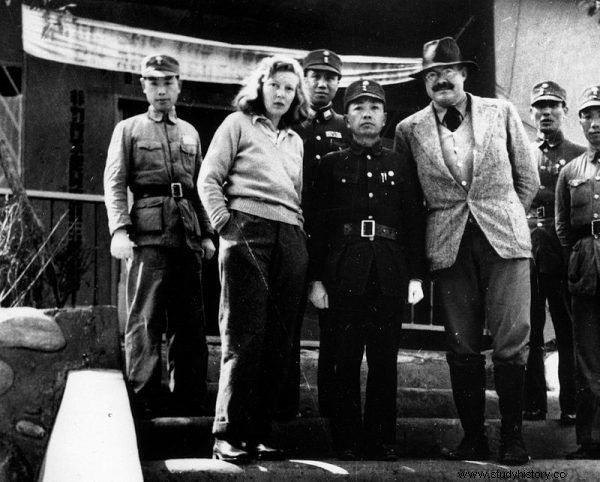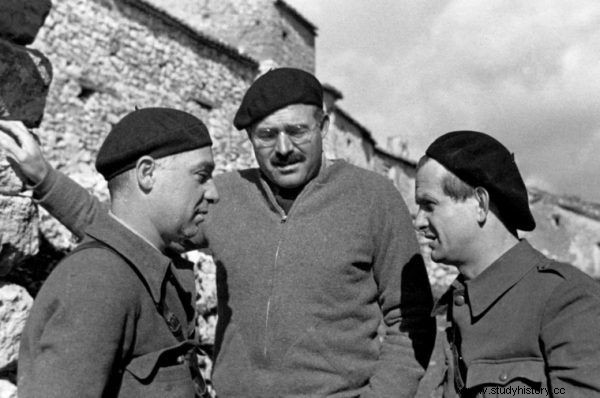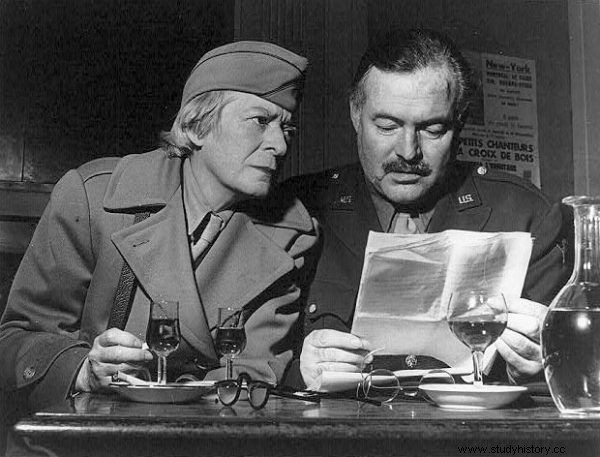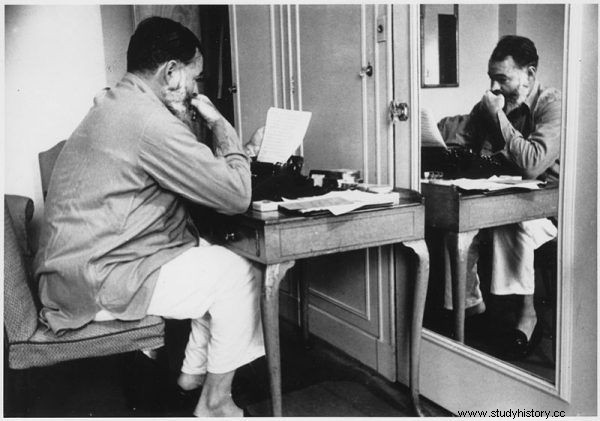"Before going to China, he was recruited to our job for ideological reasons." This note on Hemingway comes from a secret NKVD file devoted to the writer. Why did the American Nobel Prize winner agree to become a Soviet agent and how did his cooperation with foreign intelligence develop?
The information that the eminent writer and Nobel laureate, Ernest Hemingway, maintained contacts with the NKVD, and even agreed to cooperate, came to light thanks to Alexander Vasilyev. This Russian journalist and former KGB agent in the early nineties, at the request of the Foreign Intelligence Service of the Russian Federation (SWR), he examined the files of the NKVD and the KGB. On their basis, he was to prepare a study for Western historians. In this way, officers of the Russian services obtained additional funds.
The project was soon abandoned, and the change of atmosphere around it made Vasilyev feel threatened and fled abroad. However, he managed to smuggle the notes he made while he was working. They concerned, among others, the American prose writer. "The fact that these papers were to be kept secret strengthens their credibility," says Nicholas Reynolds, author of the writer's book Comrade Hemingway. Writer, sailor, soldier, spy ” .
"He will do everything he can"
Getting Hemingway to work with the Soviets was the work of Jacob Golos, an NKVD agent in New York. He met the writer several times at the turn of 1940 and 1941. They met most probably through mutual friends.
The American writer has just got married for the third time in his life. Now, persuaded by his new wife, Martha Gellhorn, he sought permission to go to China. By the way, the man agreed to gather information on the situation in this country for the needs of ... the US Department of the Treasury .

Hemingway was acquired before his trip to China in 1941.
He was asked unofficially by a senior employee on behalf of the Secretary of the Treasury, Henry Morgenthau, Jr.
The materials collected by Vasilyev indicate, however, that Golos was also quite lucky. The New York agent not only recruited Hemingway (later codenamed "Argo"), but even arranged with him a way of communicating with NKVD representatives in other countries. The identifying elements were the stamps handed over to him by the future Nobel Prize winner. Golos reported everything to Moscow in one of the reports he sent:
A few days ago I discovered that Ernest Hemingway was going to China via the Soviet Union. Can apply for a visa to enter the USSR. He's only been in New York for one day, and I haven't been able to meet him. I arranged with him that our people would meet him in China and show him the stamps he gave us. We have to try to meet him in China or the USSR, using the password previously established with him. I am convinced that he will cooperate with us and will do everything in his power .
"He appealed for help to republican Spain"
How did Soviet intelligence get interested in a talented and successful writer? Nicholas Reynolds in the book "Comrade Hemingway" argues that he was noticed as early as 1935, when Hemingway published a devastating critique of the American establishment in New Masses. The editorial staff of the magazine, which was the unofficial tribune of the US Communist Party, asked him for comment after the tragic storm that passed near his home in Key West. Hemingway's article was essentially an accusation of the Roosevelt administration of the murder of war veterans , the main victims of this storm.
In the following years, the writer also became known as a potential ally of the USSR. "In 1937, while in Spain, the« Argo »defended the People's Front in his articles and appealed for help for republican Spain," the Kremlin people watching him wrote.
It is possible that discrete attempts to recruit Hemingway were already made at that time. He was close friends with at least two communists:the Dutch filmmaker Joris Ivens and the German commissioner of the Spanish International Brigades, Gustav Regler. Undoubtedly, at that time he was closest to Soviet ideas. The writer was not, however, a classic "believer." Alexander Orlov, head of the NKVD intelligence network in Spain, assessed him in 1938 as an "individualist and sportsman", devoted not so much to communism as to the Republic.

Moscow drew attention to Hemingway, among other things, thanks to his support for the Republicans fighting in Spain.
Little changed in the next three years. If a veteran of the Spanish Civil War agreed to cooperate with the NKVD, it was only because he saw it as a sensible way to fight fascism. This is how his decision is commented on by Nicholas Reynolds in his latest book "Comrade Hemingway" :
Hemingway was an ideological recruit (..). But he was not like other "true believers" communists - he did not care about Marxism or Leninism. He joined the anti-fascist team to be more effective, or at least that's the way he thought of the NKVD.

Hemingway liked dangerous adventures. Is that why he agreed to cooperate with the NKVD?
The author of the study adds that the writer treated the secret cooperation rather as a partnership. He did not think he was betraying America; He also did not intend to mindlessly carry out orders sent from Moscow. Or maybe he liked the role of a spy? Finally, also later, during World War II, he acted as a special "envoy", although this time for the US armed forces ...
"Supposedly supporting Trotskyists"
How Argo's cooperation with the Soviets developed confirms Nicholas Reynolds' conjecture that for the American it was only a temporary alliance. The scheduled meeting in China or the USSR ultimately did not take place for unknown reasons. The stamps that the writer delivered to Golos were never used.
In the following years, attempts were made to renew contact, but they failed. In 1945, a special NKVD "officer" was sent to Hemingway in Cuba for this purpose. His efforts, however, did not bring any concrete results.
The last notes in the writer's Soviet file come from 1950. By this stage, the commissioners had probably given up hope of getting any helpful information from "Argo". "He is said to be supporting the Trotskyists and that he attacked the Soviet Union in articles and pamphlets," they said. In the Soviet newspeak, could not be formulated a greater insult.

The cooperation between Hemingway and the NKVD did not turn out to be particularly fruitful. As the Cold War worsened, however, the writer might have been afraid that FBi would follow in his footsteps.
With such poor results of the cooperation, it is not surprising that the FBI did not discover the writer's "agents", otherwise collecting notes on him sporadically for years. The Committee on Anti-American Activities, established by the House of Representatives in 1947, chasing local communists, also failed to track him. However, Hemingway did not feel safe until the end of his life. He was even obsessed that the American services were on his way. This may have contributed to the aggravation of the mental illness which resulted in taking his own life in 1961 .
"Hemingway did not understand politics and intrigue as well as he thought, and for a long time he overestimated his ability to control himself and others," says Nicholas Reynolds in his book "Comrade Hemingway." Perhaps the "adventure" with the Soviet intelligence really surpassed the American Nobel Prize winner. Although probably not entirely, since he managed to extricate himself from it with virtually no consequences.
